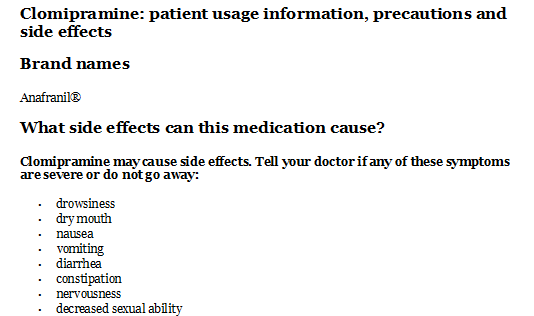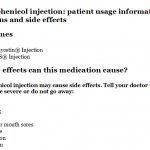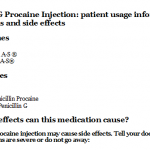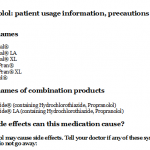
Clomipramine: patient usage information, precautions and side effects
Tuesday, May 30, 2017 by Gregory Van Dyke
http://www.naturalnewsreference.com/2017-05-30-clomipramine-patient-usage-information-precautions-and-side-effects.html

Clomipramine: patient usage information, precautions and side effects
Brand names
Anafranil®
What side effects can this medication cause?
Clomipramine may cause side effects. Tell your doctor if any of these symptoms are severe or do not go away:
- drowsiness
- dry mouth
- nausea
- vomiting
- diarrhea
- constipation
- nervousness
- decreased sexual ability
- decreased memory or concentration
- headache
- stuffy nose
- change in appetite or weight
Some side effects may be serious. If you experience any of the following symptoms or those listed in the IMPORTANT WARNING or SPECIAL PRECAUTIONS sections, call your doctor immediately or get emergency medical treatment:
- uncontrollable shaking of a part of the body
- seizures
- fast, irregular, or pounding heartbeat
- difficulty urinating or loss of bladder control
- believing things that are not true
- hallucinations (seeing things or hearing voices that do not exist)
- shakiness
- difficulty breathing or fast breathing
- severe muscle stiffness
- unusual tiredness or weakness
- sore throat, fever, and other signs of infection
If you experience a serious side effect, you or your doctor may send a report to the Food and Drug Administration’s (FDA) MedWatch Adverse Event Reporting program online (http://www.fda.gov/Safety/MedWatch) or by phone (1-800-332-1088).
IMPORTANT WARNING:
A small number of children, teenagers, and young adults (up to 24 years of age) who took antidepressants (‘mood elevators’) such as clomipramine during clinical studies became suicidal (thinking about harming or killing oneself or planning or trying to do so). Children, teenagers, and young adults who take antidepressants to treat depression or other mental illnesses may be more likely to become suicidal than children, teenagers, and young adults who do not take antidepressants to treat these conditions. However, experts are not sure about how great this risk is and how much it should be considered in deciding whether a child or teenager should take an antidepressant. Children younger than 18 years of age should not normally take clomipramine, but in some cases, a doctor may decide that clomipramine is the best medication to treat a child’s condition.
You should know that your mental health may change in unexpected ways when you take clomipramine or other antidepressants even if you are an adult over age 24. You may become suicidal, especially at the beginning of your treatment and any time that your dose is increased or decreased. You, your family, or your caregiver should call your doctor right away if you experience any of the following symptoms: new or worsening depression; thinking about harming or killing yourself, or planning or trying to do so; extreme worry; agitation; panic attacks; difficulty falling asleep or staying asleep; aggressive behavior; irritability; acting without thinking; severe restlessness; and frenzied abnormal excitement. Be sure that your family or caregiver knows which symptoms may be serious so they can call the doctor if you are unable to seek treatment on your own.
Your healthcare provider will want to see you often while you are taking clomipramine, especially at the beginning of your treatment. Be sure to keep all appointments for office visits with your doctor.
The doctor or pharmacist will give you the manufacturer’s patient information sheet (Medication Guide) when you begin treatment with clomipramine. Read the information carefully and ask your doctor or pharmacist if you have any questions. You also can obtain the Medication Guide from the FDA website: http://www.fda.gov/Drugs/DrugSafety/InformationbyDrugClass/UCM096273.
No matter your age, before you take an antidepressant, you, your parent, or your caregiver should talk to your doctor about the risks and benefits of treating your condition with an antidepressant or with other treatments. You should also talk about the risks and benefits of not treating your condition. You should know that having depression or another mental illness greatly increases the risk that you will become suicidal. This risk is higher if you or anyone in your family has or has ever had bipolar disorder (mood that changes from depressed to abnormally excited) or mania (frenzied, abnormally excited mood) or has thought about or attempted suicide. Talk to your doctor about your condition, symptoms, and personal and family medical history. You and your doctor will decide what type of treatment is right for you.
Why is this medication prescribed?
Clomipramine is used to treat people with obsessive-compulsive disorder (a condition that causes repeated unwanted thoughts and the need to perform certain behaviors over and over). Clomipramine is in a group of medications called tricyclic antidepressants. It works by increasing the amount of serotonin, a natural substance in the brain that is needed to maintain mental balance.
How should this medicine be used?
Clomipramine comes as a capsule to take by mouth. At the beginning of treatment, clomipramine is usually taken three times a day with meals as the body adjusts to the medication. After several weeks of treatment, clomipramine is usually taken once a day at bedtime. Follow the directions on your prescription label carefully, and ask your doctor or pharmacist to explain any part you do not understand. Take clomipramine exactly as directed. Do not take more or less of it or take it more often than prescribed by your doctor.
Your doctor may start you on a low dose of clomipramine and gradually increase your dose.
It may take several weeks or longer for you to feel the full benefit of clomipramine. Continue to take clomipramine even if you feel well. Do not stop taking clomipramine without talking to your doctor. If you suddenly stop taking clomipramine, you may experience withdrawal symptoms such as dizziness, nausea, vomiting, headache, weakness, sleep problems, fever, and irritability. Your doctor probably will decrease your dose gradually.
What special precautions should I follow?
Before taking clomipramine,
- tell your doctor and pharmacist if you are allergic to clomipramine, other tricyclic antidepressants such as amitriptyline (Elavil), amoxapine (Asendin), desipramine (Norpramin), doxepin (Adapin, Sinequan), imipramine (Tofranil), nortriptyline (Aventyl, Pamelor), protriptyline (Vivactil), and trimipramine (Surmontil); any other medications, or any of the inactive ingredients in clomipramine capsules. Ask your doctor or pharmacist for a list of the inactive ingredients.
- tell your doctor if you are taking a monoamine oxidase (MAO) inhibitor such as isocarboxazid (Marplan), linezolid (Zyvox), methylene blue, phenelzine (Nardil), selegiline (Eldepryl, Emsam, Zelapar), and tranylcypromine (Parnate), or if you have stopped taking an MAO inhibitor within the past 14 days. Your doctor will probably tell you not to take clomipramine. If you stop taking clomipramine, you should wait at least 14 days before you start to take an MAO inhibitor.
- tell your doctor and pharmacist what prescription and nonprescription medications, vitamins, nutritional supplements and herbal products you are taking or plan to take. Be sure to mention any of the following: anticoagulants (‘blood thinners’) such as warfarin (Coumadin, Jantoven); benztropine (Cogentin); cimetidine (Tagamet); clonidine (Catapres); dicyclomine (Bentyl); digoxin (Lanoxin); disulfiram; flecainide (Tambocor); guanethidine (Ismelin); haloperidol (Haldol); levodopa (Sinemet, Dopar); medications for nausea, dizziness, or mental illness; methylphenidate (Concerta, Metadate, Ritalin); oral contraceptives; phenobarbital; phenytoin; propafenone (Rythmol); quinidine; secobarbital (Seconal); sedatives; selective serotonin reuptake inhibitors (SSRIs) such as fluoxetine (Prozac, Sarafem), sertraline (Zoloft), and paroxetine (Paxil); tranquilizers; and trihexyphenidyl (Artane); and vitamins. Your doctor may need to change the doses of your medication or monitor you more carefully for side effects. Your doctor may tell you not to take clomipramine if you have stopped taking fluoxetine during the past 5 weeks.
- tell your doctor if you have recently had a heart attack. Your doctor may tell you that you should not take clomipramine.
- tell your doctor if you are being treated with electroshock therapy (procedure in which small electric shocks are administered to the brain to treat certain mental illnesses), if you drink or have ever drunk large amounts of alcohol and if you have or have ever had seizures, brain damage, problems with your urinary system or prostate (a male reproductive organ), irregular heartbeat, problems with your blood pressure, thyroid problems, or heart, kidney, or liver disease.
- tell your doctor if you are pregnant, plan to become pregnant, or are breast-feeding. If you become pregnant while taking clomipramine, call your doctor.
- if you are having surgery, including dental surgery, tell the doctor or dentist that you are taking clomipramine.
- you should know that this medication may make you drowsy and may increase the risk that you will have a seizure. Do not drive a car, operate machinery, swim, or climb until you know how this medication affects you.
- remember that alcohol can add to the drowsiness caused by this medication.
- tell your doctor if you use tobacco products. Cigarette smoking may decrease the effectiveness of this medication.
- you should know that clomipramine may cause angle-closure glaucoma (a condition where the fluid is suddenly blocked and unable to flow out of the eye causing a quick, severe increase in eye pressure which may lead to a loss of vision). Talk to your doctor about having an eye examination before you start taking this medication. If you have nausea, eye pain, changes in vision, such as seeing colored rings around lights, and swelling or redness in or around the eye, call your doctor or get emergency medical treatment right away.
What special dietary instructions should I follow?
Unless your doctor tells you otherwise, continue your usual diet.
What should I do if I forget a dose?
Take the missed dose as soon as you remember it. However, if it is almost time for your next dose, skip the missed dose and continue your regular dosing schedule. Do not take a double dose to make up for a missed one.
What should I know about storage and disposal of this medication?
Keep this medication in the container it came in, tightly closed, and out of reach of children. Store it at room temperature and away from excess heat and moisture (not in the bathroom). Throw away any medication that is outdated or no longer needed. Talk to your pharmacist about the proper disposal of your medication.
In case of emergency/overdose
In case of overdose, call your local poison control center at 1-800-222-1222. If the victim has collapsed or is not breathing, call local emergency services at 911.
Symptoms of overdose may include:
- seizures
- coma (loss of consciousness for a period of time)
- drowsiness
- restlessness
- loss of coordination
- sweating
- stiff muscles
- unusual movements
- fast heartbeat
- slowed breathing
- blue discoloration of the skin
- fever
- widened pupils (dark circles in the center of the eye)
- decreased urination
What other information should I know?
Keep all appointments with your doctor.
Do not let anyone else take your medication. Ask your pharmacist any questions you have about refilling your prescription.
It is important for you to keep a written list of all of the prescription and nonprescription (over-the-counter) medicines you are taking, as well as any products such as vitamins, minerals, or other dietary supplements. You should bring this list with you each time you visit a doctor or if you are admitted to a hospital. It is also important information to carry with you in case of emergencies.
Why is this medication prescribed?
How should this medicine be used?
What special precautions should I follow?
What special dietary instructions should I follow?
What should I do if I forget a dose?
What side effects can this medication cause?
What should I know about storage and disposal of this medication?
Tagged Under: Tags: chemical medicine, medication, Pharma, Prescription Medicine





